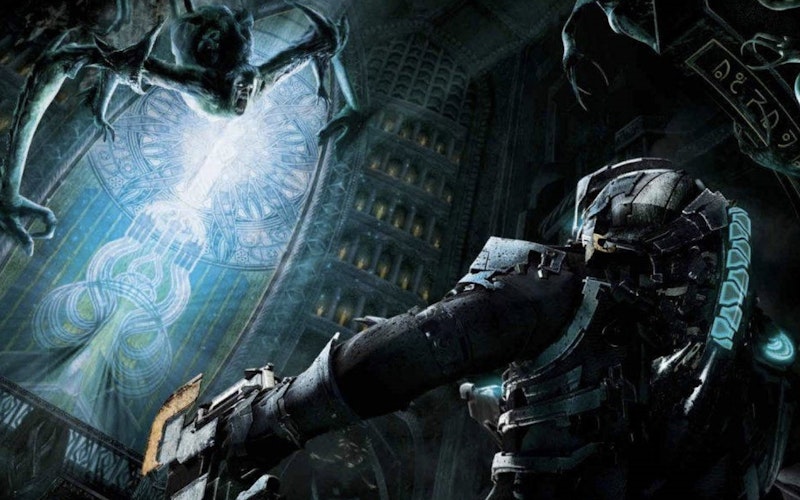
Games
Dead Space’s Disturbing Church of Unitology
I grew up with a notion of heaven as an opulent kingdom in the clouds. We fly up there upon death, walking through pearly gates and along golden streets, joining people and angels in eternal worship of our divine king. One concept about the afterlife that used to deeply unsettle me was discussion of our transformation into the image of Christ. Now, as an adult, the survival horror game franchise Dead Space has helped me articulate that old anxiety—and come to peace with a better understanding of God’s vision for heavenly community.
The first Dead Space came out in 2008. Following two sequels, the original game was entirely remade this year. It centers on the ingenious engineer Isaac Clarke, who has been dispatched with a skeleton crew to investigate why a massive spaceship has gone radio silent for weeks. The team discovers that everyone aboard has turned into monstrously mutated humans. These “Necromorphs” are mindless predators created by the Marker: an alien obelisk in the shape of twined spirals that emits a signal altering the genetic and neural codes of organisms. The Marker morphs and melds them into unspeakable nightmares, evoking the biological terrors of Lovecraftian horror such as The Colour Out of Space and Annihilation.
What makes Dead Space’s overarching story interesting is how some humans come to worship the Marker. This religion, called the Church of Unitology, anticipates an all-consuming assimilation called “Convergence,” when there will be “no war, no fear, [and] no hate,” when “the bodies of the dead will rise; united, undying, made whole by the Marker.” An alien text within the game is translated this way: “Humans will learn that by death of their worldly spirit they will be reborn in unity as a stronger community unending.”
Sound familiar?
The New Testament says that Christians are to die to their old selves and become new creations, being “one in spirit and of one mind.” These passages used to disturb me, suggesting a God who only saw me as utterly corrupt and in need of something akin to erasure. I knew I needed redemption from my fallenness, but the language suggested my individuality could be overridden through the divine signal of sanctification. Was I meant to assimilate into a hive-mind of Christ clones? We’re Christ-ians, after all. I used to wonder, “What will even be left of me? What of my worldly body, affections, and personality?” When these anxious thoughts carried me away, I echoed the doubt expressed by the Unitology follower in Dead Space: “And this Voice—are we instruments of its divinity or have we become the tools of our own destruction?”
The Church of Unitology anticipates an all-consuming assimilation called “Convergence.”
In Dead Space, Necromorphs are essentially space zombies compelled to kill and increase their number. You have to decapitate and dismember them—down to nothing but bone—before they’re defeated. You’re constantly on the defensive, shooting, shaking, and stomping them off to avoid becoming yet another Necromorph. Whereas normal zombies are content to eat and/or infect their prey, Necromorphs seek to accumulate countless bodies, enough to create a planet-sized entity that will hunt, consume, and subsume life across the whole universe. By unleashing them, the Marker means to eliminate any and all difference; Necromorphs represent a disease of sameness that not only conforms its victims to the same physical existence, but also collapses them all into the same being. “All mankind, brought together with one purpose, with one mind, with one soul,” as Unitology proclaims.
This stands in stark contrast with what I’ve come to understand about our transformation into the image of Christ. Heaven isn’t a place where God will make us holy drones. Rather, it’s a place where distinct individuals are brought together to not become the same soul, but be united in the same spirit. This is most beautifully demonstrated in Revelation’s vision of a heavenly community drawn “from every nation, tribe, people, and language” worshiping Jesus. This is what Jesus foresaw when he gave the Great Commission to “make disciples of all nations.” Isaiah prophesied that foreigners and eunuchs would be welcomed into the Lord’s house; the Ethiopian eunuch fulfilled this vision as one of the first Gentile converts.
Even so, history shows how humans still demonize diversity. In Reading While Black, Esau McCaulley labels such aversion to diversity as “sub-biblical,” saying that it “falls short of the glory of God.” What is the one thing that should unite Christians of all tribes and nations, McCaulley asks? “It is not cultural assimilation, but the fact that we worship the Lamb. This means that the gifts that our cultures have are not ends in themselves. Our distinctive cultures represent the means by which we give honor to God. He is honored through the diversity of tongues singing the same song.”
God does not want to literally assimilate us into himself or merge all of humanity into one being—to “make us whole,” as a Unitology mantra puts it, by obliterating our individuality. No, God wants to make us distinguished parts of one body, grafted into a fellowship where identities are preserved yet purified. Looking back on those passages about being one in Christ, I know that God sees and loves us as we uniquely are and will be: a diverse community, perfected in a profound plurality, and united in our love for God and each other.
Topics: Games